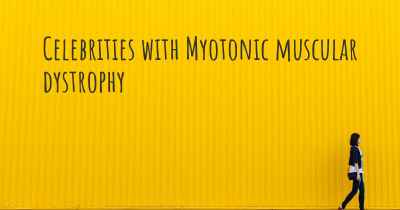What is the life expectancy of someone with Myotonic muscular dystrophy?
Life expectancy of people with Myotonic muscular dystrophy and recent progresses and researches in Myotonic muscular dystrophy

Myotonic muscular dystrophy (MMD) is a genetic disorder that affects the muscles and other systems in the body. The life expectancy of individuals with MMD can vary depending on the severity of the condition and the specific subtype they have. Generally, people with MMD have a reduced life expectancy compared to the general population. However, it is important to note that advancements in medical care and management strategies have improved outcomes for individuals with MMD. Regular medical monitoring, early intervention, and a comprehensive treatment plan can help manage symptoms and potentially extend life expectancy. It is crucial for individuals with MMD to work closely with healthcare professionals to optimize their care and quality of life.
Myotonic muscular dystrophy (MMD), also known as Steinert's disease, is a genetic disorder that affects the muscles and various other systems in the body. It is the most common form of muscular dystrophy in adults, with an estimated prevalence of 1 in 8,000 individuals worldwide. MMD is characterized by progressive muscle weakness and wasting, myotonia (delayed relaxation of muscles after contraction), and a range of other symptoms that can vary in severity.
The life expectancy of individuals with Myotonic muscular dystrophy can vary significantly depending on several factors, including the type and severity of the disease, the age of onset, and the presence of other medical conditions. It is important to note that MMD is a highly variable condition, and each individual's prognosis may differ.
Early-Onset MMD:
There are two main types of MMD: early-onset and adult-onset. Early-onset MMD, also known as congenital MMD, typically manifests at birth or during infancy. This form of MMD is generally more severe and can lead to significant complications. Infants with congenital MMD may experience respiratory difficulties, feeding problems, and developmental delays. The life expectancy for individuals with early-onset MMD can be reduced, and some may not survive beyond childhood. However, with advances in medical care and supportive treatments, the prognosis has improved over the years, and many individuals with early-onset MMD are now living into adulthood.
Adult-Onset MMD:
Adult-onset MMD, as the name suggests, typically presents later in life, usually during adolescence or adulthood. This form of MMD generally progresses more slowly and has a milder course compared to early-onset MMD. The life expectancy for individuals with adult-onset MMD is generally not significantly affected by the disease itself. However, it is important to note that MMD can lead to various complications that may impact overall health and longevity.
Complications and Impact on Life Expectancy:
While MMD primarily affects the muscles, it can also involve other systems in the body, leading to potential complications that may influence life expectancy. Some of the complications associated with MMD include:
- Respiratory Issues: Weakness in the muscles involved in breathing can lead to respiratory difficulties, especially in individuals with more severe forms of MMD. Regular monitoring and appropriate respiratory support can help manage these complications.
- Cardiac Involvement: MMD can affect the heart muscles, leading to various cardiac abnormalities. Cardiac arrhythmias, heart failure, and other cardiovascular complications may arise, which can impact life expectancy. Regular cardiac evaluations and appropriate management are crucial.
- Endocrine and Metabolic Abnormalities: MMD can disrupt the normal functioning of the endocrine system, leading to hormonal imbalances and metabolic abnormalities. These can contribute to complications such as diabetes, thyroid dysfunction, and weight gain, which may impact overall health.
- Gastrointestinal Issues: Some individuals with MMD may experience swallowing difficulties, gastrointestinal motility problems, and malabsorption. These issues can affect nutrition and may require dietary modifications or interventions.
- Mental Health and Cognitive Functioning: MMD can also have an impact on mental health and cognitive functioning. Depression, anxiety, and cognitive impairment may occur in some individuals, affecting their overall well-being and quality of life.
It is important for individuals with MMD to receive comprehensive medical care, including regular monitoring and management of potential complications. With appropriate medical interventions, supportive treatments, and a multidisciplinary approach involving various healthcare professionals, individuals with MMD can lead fulfilling lives despite the challenges posed by the condition.
Conclusion:
The life expectancy of individuals with Myotonic muscular dystrophy can vary significantly depending on the type and severity of the disease, age of onset, and the presence of other medical conditions. Early-onset MMD tends to have a more severe course and can impact life expectancy, although advances in medical care have improved outcomes. Adult-onset MMD generally has a milder course and does not significantly affect life expectancy. However, it is important to manage potential complications associated with MMD, such as respiratory issues, cardiac involvement, endocrine abnormalities, gastrointestinal problems, and mental health concerns. With appropriate medical care and support, individuals with MMD can lead fulfilling lives despite the challenges posed by the condition.








